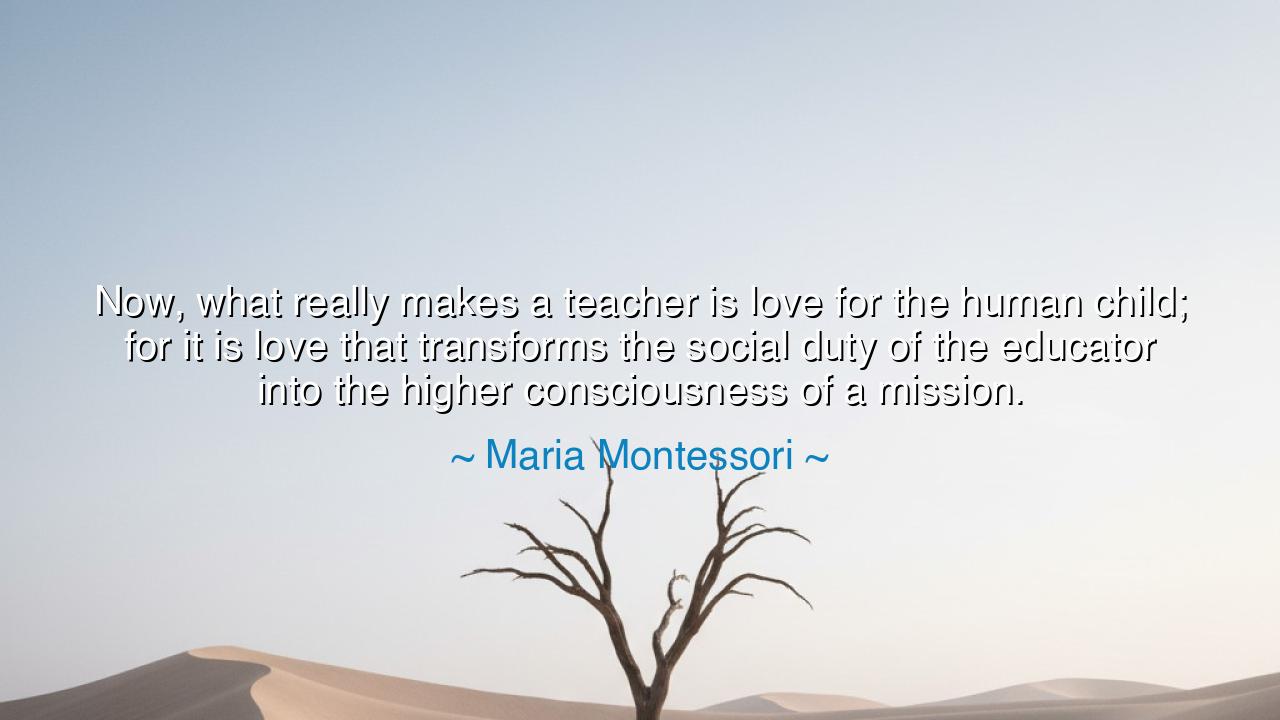
Now, what really makes a teacher is love for the human child;
Now, what really makes a teacher is love for the human child; for it is love that transforms the social duty of the educator into the higher consciousness of a mission.






Maria Montessori, visionary of childhood and revealer of the hidden powers of the young, once spoke these words of eternal weight: “Now, what really makes a teacher is love for the human child; for it is love that transforms the social duty of the educator into the higher consciousness of a mission.” In this utterance, she lifts the work of teaching from the realm of mere occupation into the sacred calling of the soul. For to guide a child is not simply to fulfill a duty to society, but to embrace a holy mission, made possible only when fueled by the flame of love.
The origin of this truth springs from Montessori’s life itself. A physician turned educator, she first worked among children deemed unteachable — the poor, the disabled, the forgotten. Where others saw burdens, she saw possibilities. Where others brought only rigid discipline, she brought love. It was this love that awakened the silent powers of her students, revealing that intelligence and dignity were present all along, waiting for a guide who cared. Thus, Montessori understood that methods and systems are but tools; the true teacher is defined not by technique alone, but by the spirit of love that transforms teaching into transformation.
History offers luminous examples of this principle. Recall Anne Sullivan, the guide of Helen Keller. Had she approached her task as mere duty, she would have abandoned it in despair after the endless frustrations of teaching a child cut off from sight and sound. Yet her persistence was not mechanical — it was driven by love, a love that believed Helen could be reached. And because she loved, she endured. Because she endured, Helen awoke to language, to knowledge, and to a life of brilliance. Without love, there would have been no miracle.
Or think of Janusz Korczak, the Polish doctor and educator who ran an orphanage in Warsaw. During the Holocaust, he was offered safety, but he refused to abandon his children. He walked with them into the camps, staying by their side until the end. His love was not abstract; it was the essence of his being, the force that made his role as a teacher and caregiver more than a profession — it was his mission. This is the depth of Montessori’s words: love raises the teacher beyond mere servant of society into a guardian of humanity.
The lesson here is unmistakable: education without love becomes a transaction, a cold exchange of facts. But education with love becomes transformation — not only of the child, but of the teacher themselves. A teacher may master all techniques and curricula, yet without love their work is hollow. But one who loves even imperfectly can inspire courage, curiosity, and growth in the smallest of hearts. Thus, it is not the brilliance of the system but the warmth of the heart that makes the difference.
What, then, shall we practice? Let every teacher cultivate love for their students, not as a passing sentiment but as a steady discipline. Let them see in each child not merely a pupil, but a soul, a seed, a mystery waiting to be revealed. Let parents and mentors, too, remember this: guidance without love is tyranny, but guidance with love is liberation. Even in moments of weariness, let us remind ourselves of the higher mission that Montessori saw — the shaping of humanity through care, patience, and devotion.
Therefore, O seekers of wisdom, remember Maria Montessori’s call: the true teacher is made by love. It is love that lifts teaching from mere duty to holy mission, from work to service, from labor to legacy. And when we embrace this truth, we ourselves become builders of a brighter future, one child, one soul, one act of love at a time. For love is the true pedagogy of the human heart, and it is by love alone that education fulfills its highest calling.






AAdministratorAdministrator
Welcome, honored guests. Please leave a comment, we will respond soon